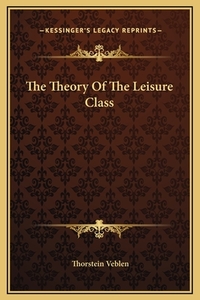You need to sign in or sign up before continuing.
Take a photo of a barcode or cover
funny
informative
inspiring
medium-paced
informative
fast-paced
No rating for this. Read it for purely education purposes.
Some of the ideas are interesting, but that's very much overshadowed by the outmoded concepts and extremely archaic language. I have a solid vocabulary and still had to look up words, and reading this book took me twice as long as a book of this length normally takes me. So, proceed with caution. I'd recommend trying to find another book that explores these concepts without all the "women are the property of men" BS.
informative
reflective
slow-paced
challenging
informative
reflective
slow-paced
A description of the upper class, so call leisure class, in different times is the main theme of the book. It describes the rise and the perpetuation of a class which does not have an obligation to obtain skills worthy to help a market place. They create mostly waste, but what they do create has some value. The book is generally difficult to read. Much of the explanation for specific reasoning that Veblen describes, is stated later rather than initially.
No sé muy bien por dónde empezar. Veblen me ha parecido un filósofo impecable y un economista brillante. Realmente no ha habido un capítulo, sección, párrafo, del libro que no haya pensado que este hombre ha nacido 200 años antes de lo que le tocaba, un auténtico máquina.
Veblen was a Norwegian American writing this around early 1900's.
I came across this book after reading Adam Smith. Veblen is focused mostly on the social ladder, conspicuous leisure, consumption.
He takes a darwinian approach to social evolution in society. I learnt new words like occidental, which means Western. I would recommend this book only if you want to know about society from an evolutionary perspective.
--Deus Vult
Gottfried
I came across this book after reading Adam Smith. Veblen is focused mostly on the social ladder, conspicuous leisure, consumption.
He takes a darwinian approach to social evolution in society. I learnt new words like occidental, which means Western. I would recommend this book only if you want to know about society from an evolutionary perspective.
--Deus Vult
Gottfried
Veblen will make you think twice about the things you want in life. These include: the big living space, the new car, the fashionable wardrobe, the prestigious university degree, the flashy vacation, the painted nails and dyed hair... etc. This book was published in 1899, so there are some aspects of his analysis that haven't aged well, but overall his ideas remain extremely relevant. If you are at all interested in your motives for spending money, this is a must read for you.





